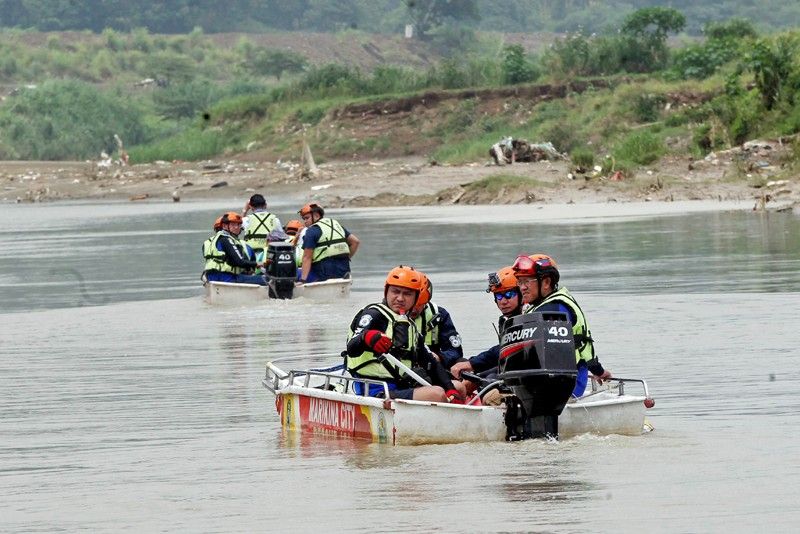More dead pigs dumped in Marikina waters

MANILA, Philippines — Marikina City Mayor Marcelino Teodoro vowed yesterday to go after the people behind the improper disposal of dead swine in the Marikina River.
As of 3 p.m. yesterday, a total of 55 dead pigs had been recovered at different portions of the river. After the recovery operation, the city government had these buried 10 feet below ground to prevent contamination. At least one was taken by the Bureau of Animal Industry (BAI) to test if this is also positive for the African swine fever (ASF) virus.
“To prevent a repeat (of the improper disposal), someone should be held liable. There should be proper disposal. We won’t let them get away with this. They should dispose the dead swine properly to prevent further contamination,” Teodoro said in Filipino.
He added that he has coordinated with the Rizal provincial government, Department of Agriculture (DA) and BAI to trace those responsible for disposing the dead swine at the river; and formed a separate search party (water and land) to trace where the carcasses came from.
Teodoro also prohibited fishing and any water-related activities at the river while it is still being checked for possible contamination. This is aside from ordering the reactivation of quarantine checkpoints to prevent the entry and spread of pig diseases that affected some provinces in the country.
He gave assurance that the local government is on top of the situation and that a team is continuously monitoring the river for floating hogs.
Earlier, he insisted that the dead swine did not come from Marikina as the city has no slaughterhouse or piggery.
Teodoro said netizens have been sending to his office photos of shallow graves of pigs that rains could have washed to the river.
But the case of dead swine floating on rivers might not be exclusive to Marikina as residents of Barangay Tikay in Malolos City, Bulacan reported the discovery of 10 bloated pigs along a creek.
Resident Baby Bulaong said she discovered the floating carcasses and immediately informed barangay officials, who gathered and buried the pigs.
Another resident, Serry Dionisio, appealed to raisers not to simply throw their dead hogs to creeks or rivers as this may cause health problems to humans.
In Quezon City, veterinary office chief Ana Maria Cabel advised raisers and piggery owners to sell their healthy hogs amid the ASF scare.
At least two hogs were found dead in Barangay Bagong Silangan yesterday. Last Wednesday, at least three dead swine were found floating in a creek that runs through the barangay.
The city has at least nine barangays that have backyard piggeries. It also identified barangays Bagong Silangan and Payatas as having more than 1,000 each of this type of piggeries.
Agriculture Secretary William Dar urged backyard hog raisers to report suspicious pig deaths to avoid the further spread of ASF virus in the country.
“The problem is in ground zero, in the earlier affected area, a lot of hog raisers hid deaths. This is now the problem,” Dar said in a press conference yesterday.
He warned against dumping the dead swine in rivers and creeks as this may spread the virus.
“Otherwise, we are just making the problem worse,” Dar said.
Manuel Carlos, Marikina’s veterinary services office chief, said that although ASF is non-transmittable to people, it would impact greatly on the economy as the virus has a mortality rate of as high as 100 percent.
“ASF is highly contagious among swine, but not to people. It is non-zoonotic, meaning it is not transmittable to people,” he stressed.
In northern Mindanao, officers of BAI and the DA are closely monitoring the points of entry for hogs, meat products and byproducts to ensure that the area will not be affected by ASF.
The region’s hog raisers though are worried about lower farmgate prices even if yet unaffected by the ASF virus.
Meanwhile, the DA’s Agricultural Credit Policy Council has approved the allocation of P60 million as livelihood assistance fund for hog raisers affected by ASF virus.
Under the program, a raiser can avail himself of P30,000 loan with interest and three years to pay.
The Department of Budget and Management earlier released P82.5 million for the implementation of measures that aim to prevent the further spread of ASF in the country. – With Catherine Talavera, Romina Cabrera, Ramon Efren Lazaro, Gerry Lee Gorit
- Latest
- Trending


























